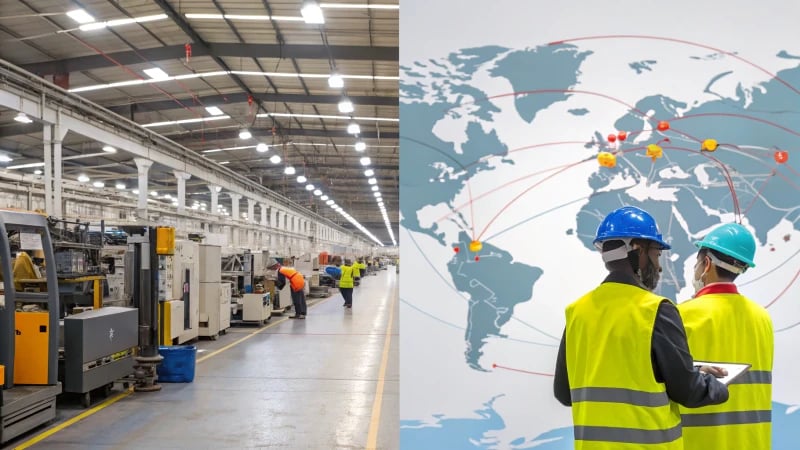
Picking the right injection molding supplier feels like choosing a partner in crime for your business success.
Local injection molding suppliers offer benefits such as lower transportation costs, improved communication, and faster response times, providing greater adaptability than global suppliers.
I remember when I first faced the daunting task of selecting a supplier. The idea of local vendors initially felt limiting, but soon I discovered their hidden gems. They offered not just cost savings on logistics but also the ease of speaking the same business language—literally and figuratively. This familiarity sped up everything from initial talks to urgent orders, making them more than just suppliers—they became partners who understood the nuances of my needs. Plus, being able to pop by for a quick inspection or just a friendly chat solidified our relationship, ensuring reliability and trust in every delivery.
Local suppliers have faster response times than global ones.True
Proximity allows local suppliers to address issues and fulfill orders more swiftly.
Global suppliers always offer lower costs than local suppliers.False
Local suppliers can reduce costs through lower transportation fees and streamlined communication.
How Do Local Suppliers Cut Transportation Costs?
I remember the first time I realized how much local suppliers could save me on transportation costs. It was like finding a shortcut on my daily commute, cutting through the clutter and getting straight to the savings.
Local suppliers reduce transportation costs through proximity to buyers, which minimizes shipping distances, lowers fuel expenses, decreases logistics complications, and enables faster deliveries, optimizing overall operational costs.

Proximity Reduces Fuel Consumption
You know that feeling when your favorite grocery store opens just around the corner? Suddenly, those long drives to restock your pantry become a thing of the past. That’s precisely what happens when you switch to local suppliers. They’re right there, reducing those lengthy shipping routes that guzzle fuel. Not only does this save on costs, but it’s also kinder to the environment1.
Lower Risks of Damage or Delays
I once had an order go awry because of a storm delaying shipments from overseas. If only I’d chosen a nearby supplier! When goods don’t have to travel halfway around the world, the chances of things going wrong—like damage or delays—dwindle significantly. Local suppliers ensure your products arrive safely and on schedule, which is like gold when it comes to meeting production timelines.
Simplified Logistics
Working with local suppliers feels like having a conversation with a friend rather than deciphering a complex code. Forget time zones or language barriers2; everything becomes straightforward and efficient. This simplicity not only saves time but also cuts down costs.
| Benefit | Local Supplier Impact |
|---|---|
| Fuel Savings | Reduced distance, lower costs |
| Reduced Risk | Less damage and fewer delays |
| Streamlined Logistics | Easier coordination and execution |
Faster Response Times
I’ll never forget the time I needed parts urgently for a project and had to wait weeks because they were being shipped from abroad. With local suppliers, urgent orders are handled with the swiftness of a local pizza delivery—quick and reliable, especially when every minute counts.
Flexible Order Management
The beauty of working with local suppliers is the flexibility they offer. Whether it’s altering order sizes or tweaking timelines, they’re usually more accommodating than their global counterparts. This kind of adaptability can be crucial when the market throws a curveball.
In summary, opting for local suppliers not only slashes transportation costs but also boosts supply chain efficiency and reliability. The benefits of quicker response times and greater flexibility make this approach incredibly appealing for anyone looking to optimize operations.
Local suppliers reduce fuel consumption significantly.True
Proximity to buyers means shorter travel distances, saving fuel.
Local suppliers face more logistical hurdles than distant ones.False
Local suppliers simplify logistics with fewer time zone and language issues.
Why Is Communication Smoother with Local Suppliers?
Have you ever wondered why dealing with local suppliers just feels easier and more natural?
Communication with local suppliers is smoother due to no language barriers or time differences, and easier face-to-face meetings. This results in faster responses, fewer misunderstandings, and increased trust.

Proximity Advantage
Local suppliers eliminate language barriers3 and time zone challenges. Direct interactions allow for immediate feedback and quicker adjustments. This reduces delays in understanding requirements and ensures product designs are communicated accurately.
| Advantages | Local Suppliers |
|---|---|
| Language | No barriers |
| Time Zones | Aligned |
Cost-Effectiveness
The lower transportation costs4 of working with local suppliers not only save money but also minimize risks like product damage or delays. Additionally, the cost of communication is reduced, as there are no international calling fees or translation services required.
Cultural Alignment
Sharing the same cultural background fosters mutual understanding. Local suppliers are familiar with business customs and client expectations, which makes negotiations smoother. This alignment enhances cooperation, minimizing conflicts and misunderstandings.
Flexibility in Service
Local suppliers often provide more customized solutions5 due to their understanding of regional needs. They can quickly adapt to design changes or urgent orders, enhancing production efficiency. This flexibility is crucial for designers who require tailor-made services.
Enhanced Trust Through On-Site Visits
Conducting on-site visits is easier with local suppliers, allowing clients to inspect production processes firsthand. This increases trust and ensures quality control measures are in place, enabling early detection of potential issues.
Stability and Compliance
Local suppliers are less affected by international disruptions and better understand regional regulations, ensuring continuous supply and compliance with local standards. This stability reduces the risk of production interruptions.
| Factors | Benefits |
|---|---|
| Regulations | Better compliance |
| Supply Chain | Fewer disruptions |
By embracing these advantages, businesses can enjoy smoother interactions and bolster their operations through reliable partnerships with local suppliers.
Local suppliers eliminate all language barriers.False
While local suppliers reduce language barriers, they may not eliminate them entirely.
On-site visits with local suppliers enhance trust.True
On-site visits allow clients to inspect processes firsthand, increasing trust.
Why Are Local Services So Adaptable?
Have you ever noticed how local services just seem to ‘get it’ when it comes to adapting to your needs?
Local services are highly adaptable due to their quick responsiveness, deep market insights, and tailored solutions, allowing them to effectively meet specific customer needs and enhance efficiency and satisfaction.

Proximity Advantage
I remember a time when I had an urgent technical issue with some equipment. The local service team arrived within hours, saving the day and reducing what could have been days of downtime. This kind of fast response is a hallmark of local services, thanks to their geographical proximity. They’re just around the corner, ready to tackle issues swiftly, whether it’s technical support or solving product problems on-site.
Transportation costs? They’re practically a non-issue with local suppliers. Being nearby means less risk of damage or delays during transit, especially for large or heavy items. I once had a large injection molding project that needed quick turnaround. The local supplier’s proximity not only cut down on costs but also eased my worries about shipping damages.
| Service Aspect | Local Service Benefit |
|---|---|
| Response Time | Quick problem-solving onsite |
| Transportation Cost | Low transportation cost6 |
Cultural Understanding
Working with someone who shares your cultural background can be a game-changer. Local suppliers often understand the nuances of your needs because they live in the same cultural landscape. It’s not just about speaking the same language; it’s about understanding those unspoken expectations. This shared understanding makes communication smoother and builds trust over time.
In my experience, having frequent interactions with local suppliers has helped forge long-lasting relationships. It’s like having a reliable partner who’s always in sync with you.
Moreover, consistent cultural understanding7 facilitates the establishment of long-term relationships.
Tailored Solutions
When it comes to customization, local services have an edge due to their deep understanding of the regional market. They can quickly adjust to specific requirements, whether it’s altering order quantities or tweaking packaging methods. I once needed a specific packaging solution for a project, and the local supplier adapted with ease, proving their high service flexibility.
| Service Aspect | Local Service Benefit |
|---|---|
| Customization | Tailored packaging solutions |
| Relationship Building | Easier long-term partnerships |
Regulatory Alignment
Navigating local regulations can be daunting, but not for local suppliers who are well-versed in them. They ensure compliance with local regulations and standards8, reducing potential risks and legal hurdles for customers.
These factors show that the flexibility of local services is not just a buzzword but a reality driven by proximity, cultural insight, and customization capabilities. Together, these elements create a service that’s not only efficient but also centered around customer needs.
Local services have lower transportation costs.True
Proximity reduces transportation risks and costs, enhancing flexibility.
Local suppliers struggle with cultural understanding.False
Local suppliers share cultural backgrounds, ensuring smoother communication.
How Does Cultural Understanding Impact Supplier Relationships?
When I first started navigating supplier relationships, it was clear that understanding cultural differences was the key to success. Imagine trying to negotiate with someone while speaking a different language—confusing, right? That’s where cultural understanding comes in.
Cultural understanding boosts supplier relationships by enhancing communication, building trust, and enabling tailored solutions, resulting in smoother collaborations, better market alignment, and increased efficiency and success.

Communication Efficiency
Reflecting on my early days in product design, I remember the frustration of a miscommunication with a supplier due to cultural nuances I hadn’t considered. Recognizing language differences and understanding local business etiquette have since become essential tools in my toolkit. These skills minimize miscommunications9 and ensure negotiations proceed smoothly, avoiding those awkward delays or workflow disruptions.
Building Trust and Long-Term Relationships
Trust isn’t just built overnight. It requires a deep understanding of your partner’s cultural expectations. I learned this firsthand when collaborating with local suppliers10. By aligning culturally, I found it easier to establish trust, leading to stronger relationships and more streamlined processes. It’s amazing how sharing a cultural background or simply respecting it can bridge gaps and create personal rapport.
Customized Solutions and Flexibility
I often found myself needing customized solutions for projects—something local suppliers understood perfectly due to their cultural insight. Whether it was adjusting order quantities or tweaking packaging methods, these suppliers could adapt quickly to meet specific market needs11. Their flexibility has been invaluable, offering tailored services that align with what I needed.
Mitigating Risks and Enhancing Stability
The stability offered by suppliers familiar with local regulations is something I don’t take for granted. This cultural understanding mitigates risks associated with compliance issues, ensuring smoother operations. Plus, being able to conduct on-site inspections effortlessly with local suppliers has significantly enhanced our quality control12.
| Advantage | Global Suppliers | Local Suppliers |
|---|---|---|
| Transportation Cost | High | Low |
| Communication Barriers | Present | Minimal |
| Response Time | Slower | Faster |
| Service Flexibility | Limited | High |
| Relationship Building | Challenging | Easier |
For someone like me working in a mid-sized manufacturing company in Canada, these dynamics are crucial. By leveraging cultural insights, I can align better with supplier expectations and market demands, enhancing production efficiency and customer satisfaction.
Engaging Local Market Insights
Local suppliers bring a treasure trove of market insights that are often hidden from outsiders. This includes consumer preferences and trends that only someone ingrained in the culture might notice. Working with culturally-aligned suppliers has allowed me to tap into these insights, supporting more strategic decision-making.
Ultimately, the impact of cultural understanding on supplier relationships is profound. Embracing cultural diversity not only boosts operational efficiency but also strengthens our competitive edge globally. Incorporating these considerations leads to more robust partnerships that withstand market fluctuations and geopolitical changes.
Cultural understanding reduces communication barriers with suppliers.True
Recognizing cultural nuances minimizes miscommunications, enhancing efficiency.
Local suppliers have higher transportation costs than global suppliers.False
Local suppliers typically have lower transportation costs due to proximity.
Why are local suppliers more stable in product supply?
When it comes to reliable product supply, local suppliers often have the upper hand. Their proximity allows them to navigate and adapt to challenges swiftly, ensuring they remain dependable partners.
Local suppliers offer stable product supply by minimizing transportation disruptions, complying with local regulations, and swiftly adapting to demand changes, enhancing reliability and responsiveness due to their proximity and cultural alignment.

Cost Efficiency and Risk Management
When I think about working with local suppliers, I often recall a time when I was managing a project that required heavy components. The cost of shipping these from overseas was staggering, not to mention the risk of delays or damage. Local suppliers significantly cut down on these transportation costs13 because the distances are shorter, which is a blessing for bulky or heavy products. Plus, with no language barriers or time differences, communication is a breeze. This clarity ensures that there are fewer misunderstandings, which means smoother operations.
| Cost Element | Local Suppliers | Global Suppliers |
|---|---|---|
| Transportation Costs | Low | High |
| Communication Costs | Low | Variable |
Quick Response and Flexibility
There was this one time I had an urgent order change, and the quick turnaround by a local supplier saved the day. They were able to adjust specifications on the fly and even visit our site to ensure everything was on track. This level of responsiveness is invaluable, especially when dealing with tight deadlines or specific market needs. Local suppliers understand these nuances and can offer tailored solutions, making them incredibly adaptable to our ever-changing demands.
Reliability in Product Supply
One of the biggest fears in supply chain management is the impact of international politics or trade policies on product flow. Local suppliers offer peace of mind here. They’re less affected by such external factors, ensuring a steady stream of raw materials. Moreover, their understanding of local regulations reduces compliance risks and ensures that products meet necessary standards.
Cultural Compatibility and Supervision
Working with local suppliers feels like working with partners who truly "get" us. Sharing a cultural background means we speak the same language—figuratively and literally. It smooths out cooperation and minimizes conflicts. Plus, having the ability to easily conduct on-site inspections builds trust and allows us to catch potential issues early on.
| Aspect | Benefit |
|---|---|
| Cultural Understanding | High |
| On-Site Supervision | Easy |
Understanding these elements has helped me leverage the advantages of local sourcing14, ensuring stability through enhanced communication, reduced costs, and reliable delivery schedules.
Local suppliers reduce transportation costs.True
Proximity to customers minimizes transportation expenses, lowering costs.
Global suppliers have lower communication costs.False
Communication with global suppliers can vary and often incurs higher costs.
Conclusion
Local injection molding suppliers offer cost savings, faster response times, and enhanced flexibility compared to global suppliers, fostering reliable partnerships and efficient operations for businesses.
-
Learn how reducing travel distances can minimize carbon emissions and contribute to sustainability goals. ↩
-
Understand the impact of language barriers on logistics efficiency and how local suppliers mitigate this issue. ↩
-
Understanding language barriers can help you appreciate the smoother communication with local suppliers. ↩
-
Learn how lower transportation costs enhance supply chain efficiency. ↩
-
Explore how tailored solutions can better meet your business needs. ↩
-
Learn how proximity reduces transportation costs and risks, crucial for large or heavy products. ↩
-
Discover how shared cultural understanding enhances communication and cooperation. ↩
-
Understand why aligning with local regulations is vital for risk mitigation. ↩
-
This link will provide insights into how recognizing cultural nuances enhances communication efficiency. ↩
-
Explore why local suppliers can build trust faster due to cultural alignment. ↩
-
Discover how flexibility in services is crucial for meeting diverse market needs. ↩
-
Understand the advantages of conducting on-site inspections to enhance quality control. ↩
-
Learn how local suppliers reduce transportation costs, impacting overall supply chain efficiency. ↩
-
Explore the comprehensive benefits of local sourcing, from cost savings to improved supplier relationships. ↩






